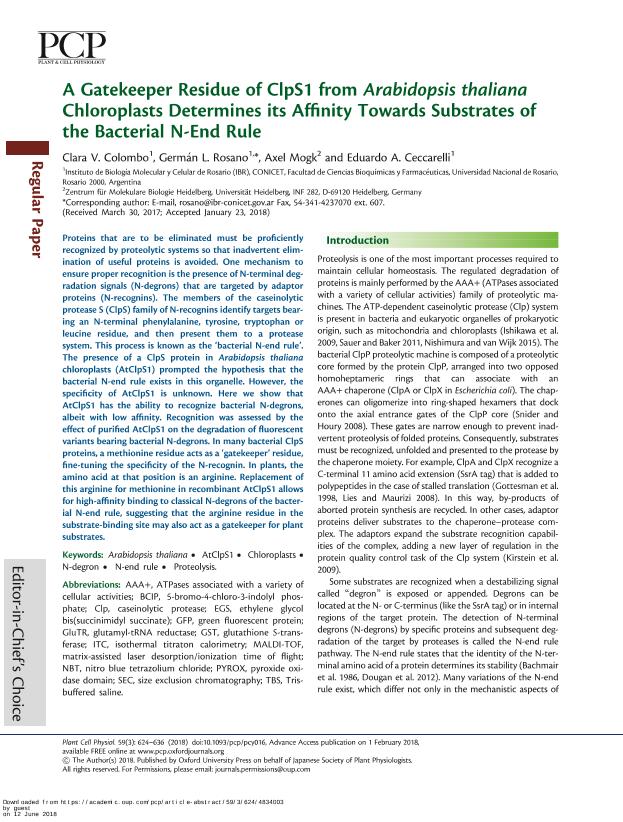Mostrar el registro sencillo del ítem
dc.contributor.author
Colombo, Clara Victoria

dc.contributor.author
Rosano, German Leandro

dc.contributor.author
Mogk, Axel
dc.contributor.author
Ceccarelli, Eduardo Augusto

dc.date.available
2019-11-25T20:31:48Z
dc.date.issued
2018-03
dc.identifier.citation
Colombo, Clara Victoria; Rosano, German Leandro; Mogk, Axel; Ceccarelli, Eduardo Augusto; A Gatekeeper Residue of ClpS1 from Arabidopsis thaliana Chloroplasts Determines its Affinity Towards Substrates of the Bacterial N-End Rule; Oxford University Press; Plant And Cell Physiology; 59; 3; 3-2018; 624-636
dc.identifier.issn
0032-0781
dc.identifier.uri
http://hdl.handle.net/11336/89741
dc.description.abstract
Proteins that are to be eliminated must be proficiently recognized by proteolytic systems so that inadvertent elimination of useful proteins is avoided. One mechanism to ensure proper recognition is the presence of N-terminal degradation signals (N-degrons) that are targeted by adaptor proteins (N-recognins). The members of the caseinolytic protease S (ClpS) family of N-recognins identify targets bearing an N-terminal phenylalanine, tyrosine, tryptophan or leucine residue, and then present them to a protease system. This process is known as the 'bacterial N-end rule'. The presence of a ClpS protein in Arabidopsis thaliana chloroplasts (AtClpS1) prompted the hypothesis that the bacterial N-end rule exists in this organelle. However, the specificity of AtClpS1 is unknown. Here we show that AtClpS1 has the ability to recognize bacterial N-degrons, albeit with low affinity. Recognition was assessed by the effect of purified AtClpS1 on the degradation of fluorescent variants bearing bacterial N-degrons. In many bacterial ClpS proteins, a methionine residue acts as a 'gatekeeper' residue, fine-tuning the specificity of the N-recognin. In plants, the amino acid at that position is an arginine. Replacement of this arginine for methionine in recombinant AtClpS1 allows for high-affinity binding to classical N-degrons of the bacterial N-end rule, suggesting that the arginine residue in the substrate-binding site may also act as a gatekeeper for plant substrates.
dc.format
application/pdf
dc.language.iso
eng
dc.publisher
Oxford University Press

dc.rights
info:eu-repo/semantics/openAccess
dc.rights.uri
https://creativecommons.org/licenses/by-nc-sa/2.5/ar/
dc.subject
ARABIDOPSIS THALIANA
dc.subject
ATCLPS1
dc.subject
CHLOROPLASTS
dc.subject
N-DEGRON
dc.subject
N-END RULE
dc.subject
PROTEOLYSIS
dc.subject.classification
Bioquímica y Biología Molecular

dc.subject.classification
Ciencias Biológicas

dc.subject.classification
CIENCIAS NATURALES Y EXACTAS

dc.title
A Gatekeeper Residue of ClpS1 from Arabidopsis thaliana Chloroplasts Determines its Affinity Towards Substrates of the Bacterial N-End Rule
dc.type
info:eu-repo/semantics/article
dc.type
info:ar-repo/semantics/artículo
dc.type
info:eu-repo/semantics/publishedVersion
dc.date.updated
2019-10-21T19:58:38Z
dc.journal.volume
59
dc.journal.number
3
dc.journal.pagination
624-636
dc.journal.pais
Reino Unido

dc.journal.ciudad
Oxford
dc.description.fil
Fil: Colombo, Clara Victoria. Consejo Nacional de Investigaciones Científicas y Técnicas. Centro Científico Tecnológico Conicet - Rosario. Instituto de Biología Molecular y Celular de Rosario. Universidad Nacional de Rosario. Facultad de Ciencias Bioquímicas y Farmacéuticas. Instituto de Biología Molecular y Celular de Rosario; Argentina
dc.description.fil
Fil: Rosano, German Leandro. Consejo Nacional de Investigaciones Científicas y Técnicas. Centro Científico Tecnológico Conicet - Rosario. Instituto de Biología Molecular y Celular de Rosario. Universidad Nacional de Rosario. Facultad de Ciencias Bioquímicas y Farmacéuticas. Instituto de Biología Molecular y Celular de Rosario; Argentina
dc.description.fil
Fil: Mogk, Axel. Universität Heidelberg; Alemania
dc.description.fil
Fil: Ceccarelli, Eduardo Augusto. Consejo Nacional de Investigaciones Científicas y Técnicas. Centro Científico Tecnológico Conicet - Rosario. Instituto de Biología Molecular y Celular de Rosario. Universidad Nacional de Rosario. Facultad de Ciencias Bioquímicas y Farmacéuticas. Instituto de Biología Molecular y Celular de Rosario; Argentina
dc.journal.title
Plant And Cell Physiology

dc.relation.alternativeid
info:eu-repo/semantics/altIdentifier/url/https://academic.oup.com/pcp/article/59/3/624/4834003
dc.relation.alternativeid
info:eu-repo/semantics/altIdentifier/doi/http://dx.doi.org/10.1093/pcp/pcy016
Archivos asociados
